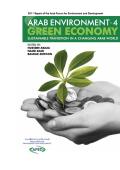This paper presents a framework for a green economy transition in tourism destinations. While the literature has suggested many models to guide sustainable tourism, very few studies have investigated the green economy in a tourism context. The main distinguishing factor between the green economy and sustainable development may be described as the acknowledgement of climate change as an existential threat to society and the aim to avoid policy, management and governance fragmentation (which has been common for environmental issues) by addressing greenhouse gas emissions, resource efficiency and social inclusiveness holistically at the economic level. This study frames the green economy concept from a tourism perspective and presents a model for translating the green economy concept into a tourism stakeholder engagement process. The model was tested in the case study of Bali, Indonesia, involving research methods such as visioning group techniques with tourism stakeholders, tourism economy and employment forecasting, resource efficiency estimates as well as resident and visitor surveys.

Renewable energy together with energy efficiency, sustainable transport, sustainable agriculture, sustainable tourism, green building and waste management are economic sectors which are often considered capable of paving the way for a transition to a green economy and providing win-win solutions offering job creation, poverty alleviation and environmental protection. However, there are a number of obstacles and challenges that might inhibit these sectors in their contribution towards greening the economy. These include limited knowledge and awareness relevant to green economy and green jobs, gaps in policy and regulations, limited financial incentives to support green initiatives, and related awareness and skill shortages.
The green growth paradigm emerged from evolving global strategies that coherently promote a more socially inclusive, low-carbon, resource-efficient, stable economy, with decreasing poverty. Opportunities and challenges associated with the paradigm shift are expected to transform the travel and tourism (travelism) sector in all respects and on a global scale. This involves the transformation of the entire travelism value chain, as well as the communities in tourism destinations. However, there is a lack of systematic reports on wide-ranging and complex implications of the green growth paradigm for the travelism sector.

This publication presents an overview of the status of tourism in Small Island Developing States (SIDS), while providing evidence of the key importance it has for the sustainable development of many islands and for the achievement of the MDGs. It draws together and updates a wide range of evidence on tourism performance and impacts and on the factors affecting the future development of the sector in SIDS, and provides policy orientations, guidelines and other tools to the various tourism stakeholders in SIDS on how to address these challenges and develop and manage tourism in a sustainable manner for the benefit of their population.
